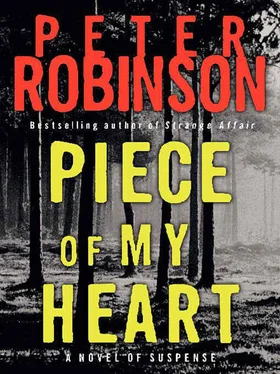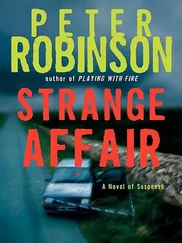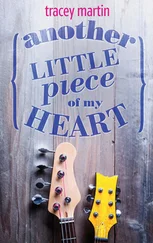Kelly put the cigarettes away and pouted.
“Last night, when we were talking in the pub,” Annie said, “you reacted in a rather extreme way about what happened.”
“Well, someone got killed. I mean, it might be normal for you, but not round here. It was a shock, that’s all.”
“It seemed like a personal shock.”
“What do you mean?”
“Do I have to spell it out, Kelly?”
“I’m not thick.”
“Then stop playing games. What was your relationship with the deceased?”
“I didn’t have a relationship. He came in the pub, that’s all. He had a nice smile, said have one for yourself. Isn’t that enough?”
“Enough for what?”
“Enough to be upset that he’s dead.”
“Look, I’m sorry if this is hard for you,” Annie went on, “but we’re only doing this because we care, too.”
Kelly shot her a glance. “You never even saw him when he was alive. You didn’t even know he existed.”
True, it was one of the things about Annie’s job that she more often than not found herself investigating the deaths of strangers. But Banks had taught her that during the course of such investigations they don’t remain strangers. You get to know the dead, become their voice, in a way, because they can no longer speak for themselves. She couldn’t explain this to Kelly, though.
“He’d been in the cottage a week,” said Annie, “and you’re telling me you only saw him when he came into the pub and said hello.”
“So?”
“You seem more upset than I think you would be if that was all.”
Kelly folded her arms. “I don’t know what you’re talking about.”
Annie turned to face her. “I think you do, Kelly.”
They sat silently cocooned in the car, Kelly stiff, facing the front, Annie turned sideways in her seat, looking at her profile. A few spots of acne stood out on the girl’s right cheek and she had a little white scar at the outer edge of one eyebrow. Outside, the wind continued to rage through the moorland grass and to rock the car a little with unexpected gusts and buffets. The sky was a vast expanse of blue with small, high fast-moving white clouds casting brief shadows on the moor. It must have been three, maybe four minutes, an awful long time in that sort of situation, anyway, before Kelly started to shiver a little, and before long she was shaking like a leaf in Annie’s arms, tears streaming down her face. “You mustn’t tell my father,” she kept saying through the tears. “You mustn’t tell my father.”
Tuesday, 9th September, 1969
On Tuesday evening, Yvonne was in her room after teatime reading Mark Knopfler’s column in the Yorkshire Evening Post . He wrote about the music scene, as well as sometimes jamming with local bands at the Peel and the Guildford, and she thought he might have something to say about Brimleigh, but this week’s column was about a series of forthcoming concerts at the Harrogate Theatre – the Nice, the Who, Yes, Fairport Convention. It sounded great, if her father would let her go to Harrogate.
She heard a knock at her door and was surprised to see her father standing there. Even more surprised to see that he didn’t appear angry with her. Her mother must have put in a good word for her. Even so, she braced herself for the worst: accusations, the cutting of pocket money and limitation of freedom, but they didn’t come. Instead, they came to a compromise. She would be allowed to go to the Grove on Mondays, but had to be home by eleven o’clock and must under no circumstances drink any alcohol. Then she had to stop in and do her homework every other school night. She could also go out Friday and Saturday. But not all night. He tried to get her to tell him where she’d been on Sunday, but all she’d said was she spent the night listening to music with friends and had lost track of the time. Somehow, she got the impression that he didn’t believe her, but instead of pushing it, he asked, “Have you got anything by Led Zeppelin?”
“Led Zeppelin? Yes. Why?” They had only released one LP so far, and Yvonne had bought it with the record token her Aunt Moira had given her for her sixteenth birthday back in March. It said in Melody Maker that they had a new album coming out next month, and Robert Plant had mentioned it at Brimleigh, when they had played songs from it, like “Heartbreaker.” Yvonne could hardly wait. Robert Plant was so sexy.
“Would you say they’re loud?”
Yvonne laughed. “Pretty loud, yes.”
“Mind if I give them a listen?”
Still confused, Yvonne said, “No, not at all. Go ahead.” She picked it out of her pile and handed it to him, the LP with the big zeppelin touching the edge of the Eiffel Tower and bursting into flames.
The Dansette record player that her father had got for five thousand Embassy coupons before he stopped smoking was downstairs, in the living room. It was a bone of contention, as Yvonne maintained that she was the only one who bought records and really cared about music, apart from the occasional Johnny Mathis and Jim Reeves her mother put on, and her father’s few big-band LPs. She thought it should be in her room, but her father insisted that it was the family record player.
At least he had bought her, for her birthday, an extra speaker unit that you could plug in and create a real stereo effect, and she had the little transistor radio she kept on her bedside table, but she still had to wait until her parents were out before she could listen to her own records properly, at the right volume.
She went down with him and turned it on. He didn’t even seem to know how to operate the thing, so Yvonne took over. Soon, “Good Times, Bad Times” was blasting out loudly enough to bring Janet dashing in from the kitchen to see what was going on.
After listening to less than half of the song, Chadwick turned down the volume and asked, “Are they all like that?”
“You’d probably think so,” Yvonne said, “but every song is different. Why?”
“Nothing, really. Just something I was wondering about.” He rejected the LP and switched off the record player. “Thanks. You can have it back now.”
Still puzzled, Yvonne put the LP back in its sleeve and went up to her room.
Banks looked out of his office window. It was market day, and the wooden stalls spread out over the cobbled square, canvas covers flapping in the wind, selling everything from cheap shirts and flat caps to used books, bootleg CDs and DVDs. The monthly farmers’ market extended farther across the square, selling locally grown vegetables, Wensleydale and Swaledale cheese, and organic beef and pork. Banks thought all beef and pork – not to mention wine, fruit and vegetables – was organic, but someone had told him it really meant “organically raised,” without pesticides or chemicals. Why didn’t they say that, then? he wondered.
Locals and tourists alike mingled and sampled the wares. When they had finished there, Banks knew, many of them would be moving on to the big car-boot sale at Catterick, where they would agonize over buying dodgy mobile phones for a couple of quid and dubious fifty-pee inkjet refills.
It was half past twelve. Banks had spent the rest of the morning after the meeting going over the SOCO exhibits lists and talking with Stefan and Vic Manson about fingerprints and possible DNA samples from the bedding at Moorview Cottage. What they would prove he didn’t know, but he needed everything he could get. And these were probably the kind of “facts” over which Detective Superintendent Gervaise salivated. That wasn’t fair, he realized, especially as he had decided to give her the benefit of the doubt, but that remark about going to the pub had stung. He had felt like a schoolboy on the headmaster’s carpet again.
Читать дальше












